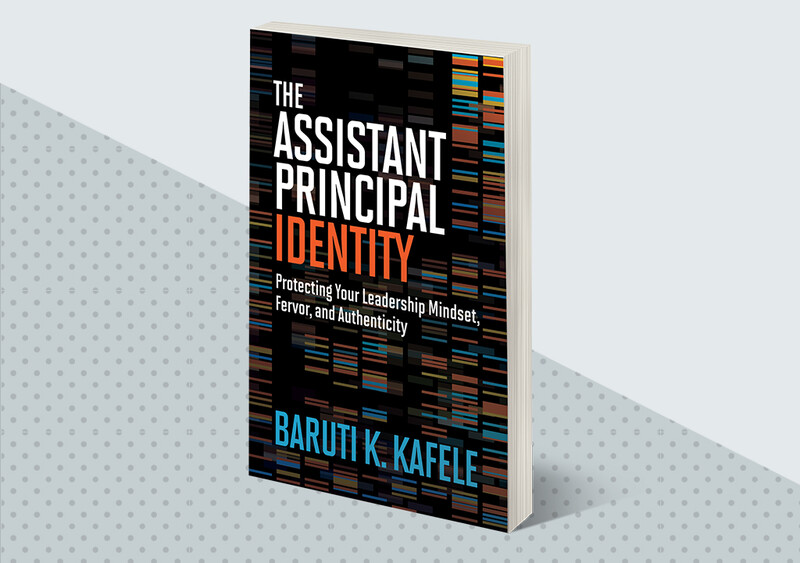Editor’s Note: As National Assistant Principals Week unfolds, it's imperative to pause and reflect on the pivotal role assistant principals play in shaping school culture and fostering student success. Baruti K. Kafele, esteemed ASCD author and education advocate, brings to light the complexities of the assistant principalship in his newest book, The Assistant Principal Identity. In this exclusive excerpt, Kafele shares a poignant narrative from his own experience, illuminating the challenges assistant principals face and the resilience required to protect one's enthusiasm for their work amid adversity. Through introspection and strategic action, Kafele underscores the importance of safeguarding enthusiasm as a cornerstone of effective leadership.
As we celebrate the dedication and impact of assistant principals nationwide, let us heed Kafele's call to reimagine and redefine the role, ensuring that enthusiasm remains not only protected, but also nurtured in the pursuit of educational excellence.
How Am I Protecting My Leadership Enthusiasm?
In my fourth year as a 5th grade teacher, my superintendent at the time decided to departmentalize the elementary schools beginning at grade 3. He felt that teachers would perform more effectively if they were given the opportunity to focus on that one content area about which they were passionate, which worked for me. I loved social studies, and now I could teach it all day. This was the first time that our students were changing classrooms. The 5th grade students were the oldest in the building—and the loudest in the hallway during the change of classes. Although my 5th grade colleagues and I really thought we had a handle on the talking between classes, the principal felt otherwise. She convened a meeting of the 5th grade teachers and emphatically stated, “Beginning tomorrow, the students will remain in their classrooms and the teachers will change classes.”
Yikes! This meant that I would teach in four different classrooms. Understand that a great deal of my enthusiasm stemmed from the way I celebrated my students through the decorations on my classroom walls (which contained photos of my students, student awards, pictures and posters of historical figures, work samples, motivational quotes, and student marking period goals).
There are many days throughout my 21 years in education before becoming a speaker and consultant that I don’t remember, but I remember that day vividly. During the meeting, I recall informing the principal of the significance of the classroom environment I created and how it greatly contributed to the overall climate and culture of my classroom. I told her emphatically that, for that reason, I couldn’t be effective in another teacher’s classroom. Her response to me was, “Kafele, I suggest you take that classroom and strap it to your back and bring it with you, because you will be changing classes tomorrow.” Ouch!
In that moment, my enthusiasm for my work was completely gone. I wanted to quit my job. I devoted a great deal of time and energy into creating a certain classroom environment—commencing work a month before school started! I felt deflated, almost broken. How was I going to be able to teach in another teacher’s space?
Well, because I knew something about people skills from my marketing days in undergraduate school and immediately following graduation, I concluded it was time to use them to the fullest. I met with my principal alone after the meeting. I convinced her that both I and the students would be placed at a disadvantage if I were made to change classrooms, that the classroom was my Superman cape, and that the students would be taught by a teacher whose cape had been taken away and was not at full strength. She replied, “Kafele, you better go to your team and tell them if I hear one sound up there, the teachers are going back to changing classes.”
No sounds were ever heard in the hallways again.
I had to examine the situation and determine how I was going to revive my enthusiasm.
In this scenario, I protected my enthusiasm. My enthusiasm had been temporarily compromised and, had I not acted quickly, it could have been compromised for an extended period of time. I had to examine the situation and determine how I was going to revive my enthusiasm, and the solution was to use my people skills.
Embrace Your Enthusiasm
As an assistant principal, you are in a position that I have described to countless school leaders over the past several years as “the most misunderstood and underutilized position in all of education.” I find that it never quite looks the same in different schools. The common denominator, however, is the large number of assistant principals who serve as full-time disciplinarians, particularly in urban and rural schools. Although this is a reality for many, it would be difficult for me to imagine that becoming a full-time disciplinarian was the driving force behind pursuing a position as a school leader. I would think that most of us wanted to come into this role to create magic for young people. When an assistant principal has been relegated to serving primarily as disciplinarian and must be on duty during lunch and be on bus duty when students arrive and leave school for the day, it’s inevitable that enthusiasm will take a real hit. So my question then would be, What are you doing to protect your enthusiasm? But I could also go on to ask, Did you bring a high level of enthusiasm with you to your assignment in the first place? If so, what was the root of your enthusiasm? Was it personal or solely professional? Did it drive you thus far? Does it still matter to you? Are you fully committed to it?
You must protect your enthusiasm by being strategic in your reaction to a situation that compromises your enthusiasm.
Your enthusiasm is fragile; it can be strong in one moment and shatter and break the next (if you allow it to). Therefore, you must safeguard it, protect it. Just as I tapped into my people skills when dealing with my principal, if you find yourself in a situation where you can’t shift your reality without the aid of your principal, you might have to reach into your people skills bag to let your principal know that there is more to you than your current assignment(s). That is, you must protect your enthusiasm by being strategic in your reaction to a situation that compromises your enthusiasm.
Looked at differently and again using the example of an assistant principal serving as a full-time disciplinarian, perhaps your time is being greatly misused (i.e., you are a full-time disciplinarian because the overall culture of your school is steeped in toxicity, translating to you expending unnecessary energy in all of the wrong places). Through an earnest assessment of your current reality, for example, you have determined that the culture of the school, not student behavior, is the root of the problem. As you reach this conclusion and shift your focus, you discover that there’s no need to spend all day on disciplinary referrals and instead turn your attention to addressing the culture of the school which, in the long run, frees you up to engage in aspects of the school that are meaningful and fulfilling. You now once again feel that you matter and hence, you have protected your enthusiasm for your work.
The Assistant Principal Identity
Baruti K. Kafele, a champion for assistant principals, offers stories from his own leadership practice and thought-provoking advice for being effective in the role.
Additional Resources for APs






